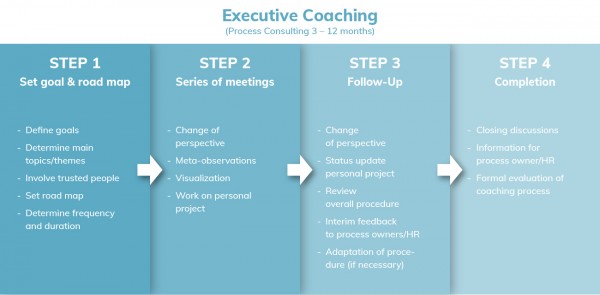The answer to the question: Does it depend on…
... the leaders’ previous experience?
... the environment the company operates in?
... what the company wants to develop in the future?
... what needs to be unlearned in order to be successful?
... what skills, or rather what attitudes, or what leadership culture it involves?
... what the arguments in favor, or against, an in-house leadership program are?
And so no two of our clients' leadership development programs are the same. Rather, it is always the particular answers to the questions asked above that lead to a colorful spectrum of different formats. See for yourself...
3-12 months
We understand executive coaching as structured support for senior managers with the aim of helping them to reflect on, maintain and increase their personal effectiveness – at the self-leadership, leadership relations and organizational leadership levels.
Executive coaching systematically creates space for communication that is not available within their company. It allows certain issues to be discussed. Our consultants support you by providing feedback, serving as sparring partners and providing resource-focused guidance.
A typical executive coaching process can be seen here:

Another format involving elements of coaching and knowledge transfer for leaders is the Leadership Navigator.
4 Coaching sequences
New to the leadership role
Taking on a new leadership role means a profound change both for the leader and for the groups of people affected. This process of transition from the old to the new role must be managed consciously and a vigilant approach must be taken. In the new context, the manager has to be able to establish a connection to the relevant stakeholders as quickly as possible, on the one hand, and build up his or her own effectiveness, on the other.
In doing so, they are confronted with a complex mixture of expectations and “expectation expectations” that they should address constructively and in a structured way and within which they must also establish their own position with their own expectations.
At the beginning of the transition in particular, it is important to strike the right balance through attitude and behavior between “wanting to understand”
The Process One Leadership Navigator helps leaders to navigate this phase and provide a valuable stage for sparring with regard to all issues relating to the assumption of the new leadership role.
The various perspectives in the set of expectations
Me and my role
The team
Relevant stakeholders
Purpose and task of the unit
Colleagues in the leadership system
My manager
The overview of the process
Approx. 4 weeks before assumption
Leadership Navigator
Approx. 4 - 6 months
After approx. 6 months
Team workshop (optional)
After approximately 7 - 9 months
Methods and coaching elements
The following methods, concepts and forms of activities may be used where needed through the Leadership Navigator
approx. 2 months
Multi-modular blended learning format with coaching sequences and Expedition Camps comprised of independent learning, exploration and reflection modules
For all those who want to explore their talents and strengths whilst addressing the challenge of ever-changing environments.
The force of disruptive change is real and impacts on all aspects of our lives. Some of us discover new personal skills or call existing competencies and approaches into question. Now that a reset has become necessary, it is good to know what we can rely on ... our own strengths and the only certainty that we currently still have: our inner being.
Your Expedition consists of research units and Coaching Camps in the experiences and results achieved. You will interview others about your “best moments” and use psychometric methods to collect data about your strengths. In the Camps you map out your strengths. Surprizing, gratifying, strong elements will be revealed ...
... By the end of your journey you will have a clear picture of your unique strengths.
The Expedition will help you explore and define your personal strengths profile. You delve your external and internal self to achieve clarity about your core competences and the unique contribution you make to your professional and personal world ... familiar, less familiar and perhaps completely new fields will open up to you.
Your Expedition is scheduled to last around 2 months. You choose the right expedition guide and coach to suit your needs from a choice of three. Appointments and other arrangements are made individually.
Where necessary, you can book your Expedition Personal Strengths as a virtual-only or blended coaching format.
You will spend a part of your journey on our digital learning platform, which offers a wealth of learning content, including motivating models, research assignments, reflection sessions and short videos.